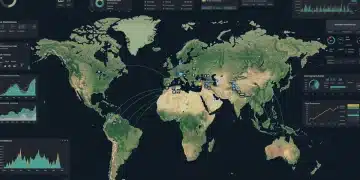FCC Roaming Regulations 2025: Time-Sensitive Opportunity

New FCC regulations for international data roaming, effective January 2025, present a time-sensitive opportunity for stakeholders in the United States, demanding immediate attention to compliance and strategic adaptation for global connectivity.
The Time-Sensitive Opportunity: New FCC Regulations for International Data Roaming Effective January 2025 (TIME-SENSITIVE) is now at the forefront of telecommunications discussions. These impending changes signal a critical juncture for mobile network operators, businesses, and consumers relying on global connectivity. Understanding the nuances of these regulations is paramount to navigating the evolving landscape of international data services.
Understanding the New FCC Roaming Regulations
The Federal Communications Commission (FCC) has unveiled a new set of regulations targeting international data roaming, set to take effect in January 2025. These rules aim to enhance transparency, protect consumers from unexpected charges, and foster a more competitive environment for global mobile services. The move comes after extensive deliberation and feedback from various industry stakeholders and consumer advocacy groups.
At its core, the new framework seeks to address long-standing issues associated with international roaming, particularly the often-opaque pricing structures and bill shock experienced by travelers. The FCC’s proactive stance underscores a commitment to modernizing telecommunications policies in an increasingly interconnected world, ensuring that American users can access reliable and affordable data services abroad without undue burden.
Key Provisions and Consumer Protection
The new FCC Roaming Regulations 2025 introduce several critical provisions designed to empower consumers and ensure fair practices. These include mandatory notifications for data usage, caps on unexpected charges, and clearer disclosure requirements for roaming rates. The objective is to make international data consumption more predictable and manageable for the average user.
- Mandatory Usage Notifications: Carriers must now send real-time alerts to customers when they approach or exceed specific data usage thresholds while roaming internationally.
- Spending Caps: Consumers will have the option to set predetermined spending limits on international data roaming, preventing exorbitant bills.
- Transparent Rate Disclosure: Detailed and easy-to-understand information regarding international roaming rates must be readily available before a customer travels.
- Dispute Resolution: Enhanced mechanisms for resolving disputes related to international roaming charges will be established.
These measures collectively aim to create a more equitable playing field, reducing information asymmetry between carriers and consumers. The FCC emphasizes that these protections are not just about preventing bill shock but also about fostering trust and encouraging greater use of international services, ultimately benefiting the broader digital economy.
Impact on Mobile Network Operators and MVNOs
The impending FCC Roaming Regulations 2025 will significantly reshape operational strategies for Mobile Network Operators (MNOs) and Mobile Virtual Network Operators (MVNOs) in the United States. Compliance will require substantial adjustments to billing systems, customer service protocols, and international roaming agreements. The January 2025 deadline means these entities have a limited window to implement necessary changes.
Operators must now re-evaluate their existing roaming partnerships and negotiate new terms that align with the FCC’s transparency and consumer protection mandates. This could lead to a consolidation of roaming partners or the emergence of new, more compliant offerings. The financial implications are also considerable, as carriers may need to invest in upgraded IT infrastructure and staff training to meet the new regulatory demands.
Operational Adjustments and Compliance Challenges
Achieving full compliance with the new FCC Roaming Regulations 2025 presents several operational challenges. MNOs and MVNOs must ensure their systems can accurately track real-time international data usage and trigger timely notifications. This often involves complex integrations with roaming partners’ networks, which can vary significantly in technological sophistication.
- System Upgrades: Billing and notification systems require significant upgrades to support real-time alerts and customizable spending caps.
- Inter-carrier Agreements: Renegotiating agreements with international roaming partners to ensure data sharing and compliance with new disclosure rules.
- Customer Service Training: Equipping customer service representatives with the knowledge to explain new policies and resolve roaming-related inquiries effectively.
- Marketing and Communication: Developing clear communication strategies to inform customers about the new rules and available protections.
The compliance burden is not merely technical; it also involves a fundamental shift in how operators manage their international roaming portfolios. Those that adapt quickly and effectively will likely gain a competitive advantage, while those that lag may face penalties and reputational damage.

Strategic Opportunities for Businesses
While compliance with the new FCC Roaming Regulations 2025 presents challenges, it also uncovers significant strategic opportunities for businesses, particularly those engaged in global trade, remote work, or international travel. Companies can leverage these regulations to optimize their mobile expenditures, enhance employee productivity abroad, and even develop new service offerings.
The increased transparency and predictability in international data roaming costs allow businesses to budget more effectively for their mobile workforce. No longer will companies be blindsided by unexpected roaming charges, enabling better financial planning and resource allocation. Furthermore, the push for clearer pricing may stimulate innovation in business-specific roaming plans and solutions.
Leveraging Compliance for Competitive Advantage
Businesses that proactively embrace the spirit of the FCC Roaming Regulations 2025 can transform regulatory compliance into a competitive edge. By actively seeking out carriers that offer the most transparent and consumer-friendly international roaming options, companies can demonstrate their commitment to employee well-being and operational efficiency.
- Cost Optimization: Utilize transparent pricing to select carriers offering the most cost-effective international data plans for business travel.
- Enhanced Productivity: Provide employees with reliable and affordable international data, ensuring seamless communication and productivity while abroad.
- New Service Development: Telecom providers and tech companies can innovate new products and services tailored to the new regulatory environment, such as enhanced roaming management tools or specialized IoT roaming solutions.
- Improved Employee Satisfaction: Reduce employee stress related to international data costs, contributing to higher morale and retention.
The shift towards greater transparency also encourages businesses to review their internal mobile policies, ensuring they align with the new regulatory landscape and maximize the benefits for their global operations. This is a time to be proactive, not just reactive, to regulatory changes.
Consumer Benefits and Empowerment
For the average American consumer, the FCC Roaming Regulations 2025 represent a significant step towards greater empowerment and protection when traveling internationally. The days of returning home to exorbitant and unexpected mobile bills are intended to become a thing of the past. These regulations are designed to provide clarity and control, putting more power in the hands of the user.
The ability to receive real-time usage alerts and set spending caps means consumers can manage their international data consumption proactively, avoiding financial surprises. This newfound control is expected to encourage more confident use of mobile services abroad, whether for navigation, communication, or accessing critical information, ultimately enhancing the travel experience.
Navigating International Travel with Confidence
The forthcoming changes mean that preparing for international travel will include a clearer understanding of mobile costs. Consumers will be able to compare international roaming plans with greater ease, making informed decisions before they even leave the country. This transparency fosters a sense of security that was often lacking in previous international roaming scenarios.
- Elimination of Bill Shock: Real-time alerts and spending caps directly address the primary cause of unexpected high bills.
- Informed Choices: Clear disclosure of rates enables consumers to choose the best roaming plan or alternative connectivity options (e.g., local SIMs, eSIMs) with confidence.
- Reduced Stress: Knowing exactly what to expect regarding data costs significantly reduces anxiety associated with international mobile usage.
- Enhanced Connectivity: Consumers may feel more comfortable using data services abroad, leading to a more connected and enriched travel experience.
The FCC’s focus on consumer protection through these regulations is a welcome development, signaling a commitment to ensuring that digital connectivity remains accessible and fair for all users, regardless of their location.
Global Connectivity Landscape Post-2025
The introduction of the FCC Roaming Regulations 2025 is poised to have ripple effects beyond the United States, influencing the broader global connectivity landscape. As one of the world’s largest telecommunications markets, changes within the US often set precedents for international standards and practices. Other regulatory bodies worldwide may look to the FCC’s model as they consider their own approaches to international data roaming.
This could lead to a global trend towards greater transparency and consumer protection in international mobile services. Furthermore, the operational adjustments required from MNOs and MVNOs could stimulate innovation in global roaming solutions, potentially leading to more competitive pricing and diverse service offerings across different regions. The market is dynamic, and these regulations are a significant catalyst for change.
Forecasting Market Evolution and Innovation
The period following January 2025 will be crucial for observing how the market adapts to the new FCC Roaming Regulations 2025. We can anticipate an acceleration in the development and adoption of technologies like eSIMs, which offer greater flexibility for consumers to switch carriers and plans while traveling, bypassing traditional roaming challenges.

Carriers might also explore new business models, such as subscription-based global data plans or partnerships with travel-focused technology companies. The emphasis on transparency could also drive demand for clearer, simpler pricing models that appeal to a global audience. This regulatory push could ultimately lead to a more harmonized and user-friendly international mobile experience.
Ultimately, the long-term impact will depend on how effectively the regulations are enforced and how innovatively the industry responds. The goal is not just compliance but a healthier, more competitive market that benefits everyone.
Preparing for the January 2025 Deadline
With the January 2025 deadline rapidly approaching, preparation is key for all affected parties. Mobile network operators, MVNOs, businesses, and even frequent international travelers need to understand their responsibilities and opportunities. Proactive engagement with the new FCC Roaming Regulations 2025 is not just about avoiding penalties; it’s about strategic positioning in a changing market.
Carriers should be well into their implementation phases, conducting thorough audits of their systems and processes. Businesses should be reviewing their travel policies and engaging with their mobile providers to understand new plan options. Consumers, too, should familiarize themselves with their rights and the new tools available to manage their international data usage.
Actionable Steps for Stakeholders
For MNOs and MVNOs, this means ensuring that all technical and operational systems are updated and tested for compliance. This includes robust notification systems, flexible spending cap options, and comprehensive data disclosure mechanisms. Training customer support staff on these new regulations is also critical to ensure a smooth transition and effective communication with subscribers.
- For Carriers: Conduct a full audit of international roaming services, update billing and notification systems, and train staff on new compliance requirements.
- For Businesses: Review corporate travel policies, consult with mobile providers on new roaming plans, and educate employees on managing international data.
- For Consumers: Familiarize yourself with the new FCC rules, check your carrier’s updated international roaming policies, and explore options for setting spending limits.
The time-sensitive nature of these regulations demands immediate and sustained attention. Those who prepare diligently will be best positioned to thrive in the new era of international data roaming, ensuring seamless connectivity and enhanced user satisfaction.
Key Aspect |
Brief Description > |
|---|---|
Effective Date |
January 2025 marks the official implementation of new FCC international data roaming rules. |
Consumer Protection |
Mandatory usage notifications, spending caps, and transparent rate disclosures are key benefits for users. |
Operator Impact |
Requires significant system upgrades, renegotiation of roaming agreements, and staff training for compliance. |
Strategic Opportunity |
Businesses can optimize costs and enhance employee productivity; carriers can innovate new service offerings. |
Frequently Asked Questions About FCC Roaming Regulations
The primary goals are to enhance transparency in international data roaming, protect consumers from unexpected charges, and foster a more competitive market. These regulations aim to give users greater control and predictability over their mobile expenses when traveling abroad.
US travelers will benefit from mandatory real-time usage notifications, the option to set spending caps, and clearer disclosure of roaming rates. This will help prevent bill shock and enable more informed decisions regarding international data usage.
Operators must upgrade billing and notification systems, renegotiate international roaming agreements for data sharing and compliance, and train customer service teams. These changes are crucial to meet the new transparency and consumer protection mandates.
Yes, businesses can leverage increased transparency to optimize mobile costs for their global workforce, enhance employee productivity abroad with predictable data access, and explore new service offerings. This allows for better budgeting and operational efficiency.
As a major market, the US FCC’s new regulations could set a precedent for other countries, potentially influencing a global trend towards greater transparency and consumer protection in international roaming. This may stimulate innovation and more competitive global pricing.
Looking Ahead: The Future of Global Connectivity
The FCC Roaming Regulations 2025 mark a pivotal moment for global connectivity, signaling a future where transparency and consumer empowerment are paramount. Stakeholders must remain vigilant, adapting their strategies to not only comply but to innovate within this new framework. The coming months will reveal how effectively the industry integrates these changes, paving the way for a more reliable and predictable international mobile experience for all. This time-sensitive opportunity demands immediate action and strategic foresight to shape the next generation of global data roaming.





